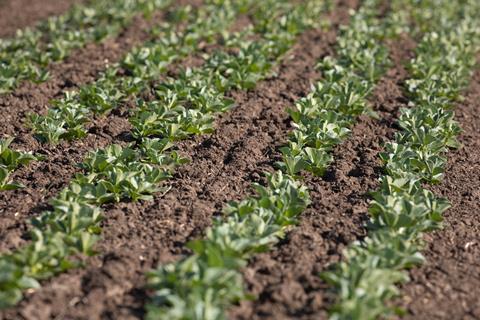Organisation says current recommendations are outdated and need updating
A new initiative is aiming to boost bean production in the UK by determining definitive best practice.

The ability of beans to fix their own nitrogen while also leaving it in the soil for the following crop is well known to growers, making legumes an important break crop in UK rotations.
However, uptake of growing beans has long been curtailed by the perception that they’re unreliable, despite the multiple benefits they provide.
“While there are scientific publications that clearly demonstrate across north-west Europe that beans are no more unreliable than other spring-sown crops, the perception is real and impactful,” said Roger Vickers, chief executive of growers’ organisation PGRO.
“The current recommendations in RB209 have not changed in decades and it is not at all clear from where the recommendations originated. Seeing this as a possible weakness in the agronomic approach to bean cropping, we are embarking on a study that aims to establish new best practices and recommendations.”
Looking for ANSWERS
To tackle this, a new project called ANSWERS, or ‘Alleviating Nutritional Stress for Wider Environmental Rewards in Sustainable UK protein crop production’, will bring together PGRO, NPZ (LSPB), Yara, and the University of Lincoln, alongside real field-scale trials, to develop practical nutrient plans to enhance nodule activity and nitrogen fixation, productivity, yield stability, protein content and climate resilience.
“ANSWERS will use data-driven solutions to help move UK food production towards a sustainable, productive, net-zero emissions future,” Vickers added. “The goal is to optimise the on-farm yield and quality of faba bean as an alternative UK-produced protein source, to directly influence significant improvement in productivity, sustainability, the environmental impact of farming, progression towards net zero emissions and help create resilient food supply chains.”
ANSWERS will build upon recent studies undertaken by PGRO, Yara and the Bean YEN network, which revealed that poorly-understood nutrient requirements are a key barrier to increasing production.
After collecting data from 318 farms, Yara found that substantial proportions of faba beans are deficient in potassium, magnesium, manganese, molybdenum and boron. These nutrient deficiencies impair nodule activity, nitrogen fixation and plant resilience to environments.
“Despite their indisputable benefits, only 3.8 per cent of UK arable land is currently used for field bean production,” said Vickers. “The low area of pulses reflects variable yields (mean 5.1t/ha, range 1-8t/ha) and low gross margins in some years, but potential yield has been shown to be much higher – as much as 13.7t/ha in field beans. In 2024 we saw some UK farms achieving over 9t/ha.
“There is significant potential to increase area, which would help to replace imported soya in animal feeds and reduce the carbon footprint of animal production systems.”
ANSWERS is funded under the Defra Farming Innovation Programme Small R&D Partnership Projects competition and will run for three years.



